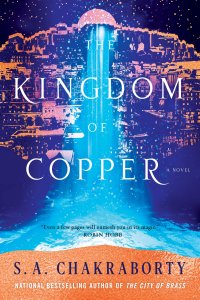Paul Di Filippo Reviews The Kingdom of Copper by S.A. Chakraborty
 The Kingdom of Copper, S.A. Chakraborty (Harper Voyager 978-0-06-267813-3, $26.99, 640pp, hardcover, January 2019)
The Kingdom of Copper, S.A. Chakraborty (Harper Voyager 978-0-06-267813-3, $26.99, 640pp, hardcover, January 2019)
Chakraborty’s second novel, a sequel to The City of Brass, which I reviewed on this site, continues to chronicle with grace and elegance the ongoing exploits of Nahri, once an unassuming child of Cairo’s streets, whose true role was proven to be the scion of a race of magical healers. When her mystical powers exploded into her daily life, she was spirited away from the mundane world by a fire elemental named Dara, and brought to the hidden or wainscot society of Daevabad, the fabulous city which lies behind dimensional folds somewhere in the Middle East. There she ended up engaged to one of the king’s sons, Prince Muntadhir, though her affections resided with the other son, Ali. And Dara, who was also somewhat smitten with Nahri, seemed to have met his end.
That radically short and crude synopsis of mine, eliding all the many wonders of the volume that I earlier raved about, brings us to the start of the present book. Immediately the reader is plunged into important developments that carry many of the threads to a kinked tangle.
Nahri’s wedding to Muntadhir finds husband and wife acknowledging a relationship based on diplomacy and formality and court ceremony, leaving each free to pursue separate interests (although Nahri is constrained from total freedom by the eagle eye of father-in-law King Ghassan). She becomes more friendly with her sister-in-law Zaynab.
Dara has been revived and made more powerful by release from the ancient strictures imposed on his race by Suleiman. Now he can wreak vast destruction if he so wills, and is seeking revenge.
Ali, in exile, has been adopted into a tribe at Am Gezira, for whom he uses his own water-centric magical powers to create oases and restore a dying land.
Five years pass. Nahri has settled reluctantly into a modest groove of using her healing powers one-on-one on ailing citizens, but chafes at her inability to do more. The discovery of an old hospital in the city, formerly run by her kind, emboldens her to imagine reopening it–with the help of a shafit doctor who practices human-style medicine, one Subha Sen.
Meanwhile outside Daevabad, Nahri’s mother, Manizheh, allied with Dara, is looking to stage an invasion of the city and kill the King, so as to restore Daevabad to the rule of her people, the Nahids. A lost caravan arriving at Ali’s oasis forces him to return home, where his life is promptly endangered, and he must make peace with his father and brother. His reunion with Narhi is troubled and painful.
These are the three basic vectors of action–Nahri’s quest for a purpose and larger sphere of action; Ali’s quest for his proper place in the scheme of things; and Manizheh’s quest for revolution–among which Chakraborty bops around, using Ali, Dara and Nahri as her alternating viewpoint characters. And of course, some of the intersections among them will receive contrasting accounts. With all these players now arrayed on the gameboard, the scene is set for an eruption of massive, paradigm-overturning violence, and Chakraborty’s multiple fireworks and cataclysms don’t disappoint.
There are several things to note about this book which either continue or alter the tenor of the first volume in fruitful ways. That earlier book perforce had to focus on discovery and learning–both for Nahri and the readers. Nahri knew literally nothing of her heritage, nor did the folks in Daevabad know about her. Nor did we know anything. And so there was a concentration on getting acquainted, so to speak, with the various people and powers and history. There’s still a substantial amount of that here, as Nahri investigates her abilities, and new disclosures about historical events come forth. But there’s more of a sense of characters who know resolutely who they are and who are fixed on a certain track of action. There’s more of a fatedness about events.
Second, Chakraborty digs into societal issues: economics and underclasses and power trips. This places her book into a growing niche of fantasies that do not neglect such issues, books like Seth Dickinson’s The Traitor Baru Cormorant. Charkaborty offers no simplistic, black-and-white divisions. True, King Ghassan is a tyrant, but rebel leader Manizheh proves arguably a worse monster.
The romance angles of this second book have also shifted a bit in tone. The first volume found Nahri more naive and idealistic about the rivals for her affections, and the general power of love. Now she–and they–have assumed a more hard-bitten attitude.
What continues as before is Charkaborty’s generous provision of sensual details in a sometimes Dunsanyian fashion (“Globes of enchanted flames in rainbow-bright hues nestled in the fruit trees, and fine carpets embroidered with hunting scenes had been laid upon the trimmed grass.”); imaginative backstory; multiple rival races of fantastical beings; sharp dialogue; and total immersive believability of this world. We get to see more of Nahri’s weird surgeries: check out the opener to Chapter 6, where she has to remove stony internal growths from a fellow given to spending parts of his life as a statue. The creepy side to these powers of the Nahids also comes out in moments such as when Manizheh shatters a swordsman’s hand with spell. And Chakraborty proves herself adept at staging big exciting battle scenes as well, not something really exhibited in the first book so much.
Perhaps the main theme of the book is weariness with old destructive patterns and the burden of the past. Ali makes a speech which is elsewhere echoed almost exactly by Nahri.
“No, I wasn’t afraid. I was tired.” Ali’s voice broke on the word. “I’m tired of everyone in this city feeding on vengeance. I’m tired of teaching our children to hate and fear other children because their parents are our enemies. And I’m sick and tired of acting like the only way to save our people is to cut down all who might oppose us, as if our enemies won’t return the favor, the instant power shifts.”
If this attitude seems to resonate with our current climate, I suspect it’s intentional. And as the massive destruction and upheavals which Chakraborty is willing to inflict on her own beautiful subcreation shows, sometimes thing have to get worse before they can get better.
 While you are here, please take a moment to support Locus with a one-time or recurring donation. We rely on reader donations to keep the magazine and site going, and would like to keep the site paywall free, but WE NEED YOUR FINANCIAL SUPPORT to continue quality coverage of the science fiction and fantasy field.
While you are here, please take a moment to support Locus with a one-time or recurring donation. We rely on reader donations to keep the magazine and site going, and would like to keep the site paywall free, but WE NEED YOUR FINANCIAL SUPPORT to continue quality coverage of the science fiction and fantasy field.








